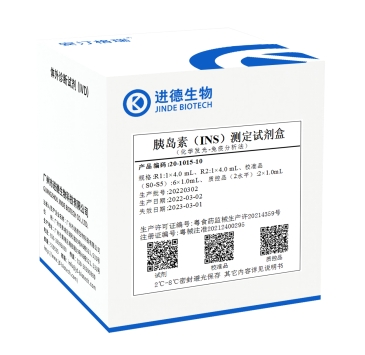Insulin(胰岛素)
Insulin Chemiluminescent Immunoassay ☑️ Description Insulin is a key hormone involved in the control of blood glucose and regulation of fatty acid metabolism. Inappropriately elevated insulin in blood (hyperinsulinemia) is associated with hypoglycemia or, in disorders linked to the metabolic syndrome, hyperglycemia. Hypoglycemia can manifest as reduced cognition, weakness, slurred speech, and visual disturbances and can progress to seizures, coma, and death. Causes of hyperinsulinemia include insulinoma, insulin resistance, noninsulinoma pancreatogenous hypoglycemia syndrome, insulin antibodies, surreptitious insulin administration or other drug-induced hyperinsulinism (eg, sulfonyl urea), incretin effects after bariatric surgery, and congenital hyperinsulinism. Insulin measurements are used to diagnose the etiology of hypoglycemia of unknown cause in otherwise healthy individuals and those who have undergone bariatric surgery. ☑️ The Insulin Test: This product is used to quantitatively determine the content of insulin (INS) in human serum.
Insulin is secreted by pancreatic β cells and is the only hormone in the human body that lowers blood sugar.
Insulin secretion is mainly regulated by the blood glucose concentration. When the blood glucose concentration increases, it can stimulate insulin secretion.
Normal fasting insulin content is 4.12mIU/L~22.33mIU/L.
Type I diabetic patients are severely lacking in insulin secretion, the fasting insulin level is significantly lower than normal, and insulin release after a meal cannot increase with the increase in blood sugar.
In patients with type II diabetes, fasting insulin levels can be normal in the early stage, and the peak of insulin release after meals is mostly delayed in 2~3 hours.
In patients with insulinoma, tumor secretion is not regulated by blood glucose concentration, the insulin level is significantly higher than that of normal people, the physiological regulation response of normal blood sugar is changed, and insulin is excessively secreted.
1) For the diagnosis of diabetes, insulinoma, insulin resistance syndrome and other diseases.
2) Accurately judge the physiological function of pancreatic islet β cells.
Contact Us
Follow us
 Wechat
Wechat

